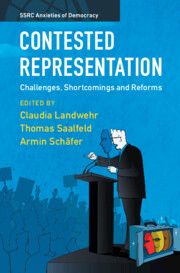Book contents
- Contested Representation
- SSRC Anxieties of Democracy
- Sponsored by the Social Science Research Council
- Contested Representation
- Copyright page
- Contents
- Figures
- Tables
- Contributors
- Acknowledgments
- 1 Introduction
- Part I The Contested Idea of Political Representation
- 2 Contested Representation
- 3 Deliberative Minipublics and the Populist Conception of Representation As Embodiment
- 4 An Evolved Representative Democracy in a Brave New World of Ideological Protest
- 5 Rising to the Challenge?
- 6 Progress and Failure in Achieving Equal Representation
- Part II Representation and Responsiveness in Unequal Societies
- Part III Polarization, New Cleavages, and Shifts in Democratic Government
- Part IV Constitutional Crisis and Institutional Reform
- Bibliography
- Index
4 - An Evolved Representative Democracy in a Brave New World of Ideological Protest
from Part I - The Contested Idea of Political Representation
Published online by Cambridge University Press: 03 November 2022
- Contested Representation
- SSRC Anxieties of Democracy
- Sponsored by the Social Science Research Council
- Contested Representation
- Copyright page
- Contents
- Figures
- Tables
- Contributors
- Acknowledgments
- 1 Introduction
- Part I The Contested Idea of Political Representation
- 2 Contested Representation
- 3 Deliberative Minipublics and the Populist Conception of Representation As Embodiment
- 4 An Evolved Representative Democracy in a Brave New World of Ideological Protest
- 5 Rising to the Challenge?
- 6 Progress and Failure in Achieving Equal Representation
- Part II Representation and Responsiveness in Unequal Societies
- Part III Polarization, New Cleavages, and Shifts in Democratic Government
- Part IV Constitutional Crisis and Institutional Reform
- Bibliography
- Index
Summary
Our scholarly understanding of “representative democracy” is often defined by two major actors: voters and the representatives they elect. This two-way interaction of democratic governance has its perils. And the critiques of this type of governance have been multifaceted. Just to name a few, not all members of the public have an opportunity to engage in the electoral process to elect representatives. In addition, elected officials of representative democracies often ignore minority concerns in the hope to capture majoritarian preferences voiced by voters. Robert Dahl (1989) astutely points out that there is actually no nation that meets all the requirements of a true democracy, which should consist of inclusiveness, enlightened understanding, equal participation, equal say, and citizens’ control of the agenda. What many nations have managed to achieve is representative democracy – an inferior second choice. Others have encouraged an expansion of our understanding of representation. Saward (2006), for example, argues that the acceptance or rejection of representative claims provides another way for scholars to understand representation that moves beyond elections and political parties.
- Type
- Chapter
- Information
- Contested RepresentationChallenges, Shortcomings and Reforms, pp. 46 - 62Publisher: Cambridge University PressPrint publication year: 2022



